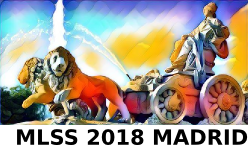Machine Learning Summer School
27th Aug. - 7th Sep. 2018 Madrid, Spain at Universidad Autónoma de Madrid

In this section you can find all the information for the session Machine Learning in the industry scheduled on 6/9/2018.
Some photos from this session can be seen here: Photos.
Title: Machine Learning and Big Data in the hands of customers
Speaker: José Antonio Rodríguez Serrano, BBVA Data & Analytics
Time slot: 14:30-15:15
Abstract:
If we ask you which industries have lots of data and leverage machine learning for
competitive advantage, you will probably think of search engines, ecommerces, telcos or
social networks. And yet, you might not be aware of it, but a new older player is coming
(spoiler: banks). Back some years now, BBVA realized that they had the data to be a major
big data player: not only for knowing people purchasing behavior, but also their financial
health, the relationships among companies (client-supplier, financial risk, etc), web
interactions, apps, etc. So the question is, can a bank become a data and algorithmic driven
company?
BBVA Data & Analytics, a center of excellence in financial data analysis within the BBVA
group, has delivered in the last years several data engines that provide the intelligence
behind digital banking products, in complex setups that involve cutting-edge technologies
working in coordination with legacy systems. In this talk we will revisit our experience
conceiving, designing, developing and delivering these highly complex products. We will
discuss how we organize ourselves to spearhead the transformation of BBVA, focusing on
three main stages in the lifecycle of digital products: inception of an idea using design fiction;
development with an agile-based software process tailored for data science, in close
collaboration with other business areas; and delivery in coordination with existing systems to
put our data-enabled digital products in the hands of customers.
Title: Data-Efficient Reinforcement Learning
Speaker: Haitham Bou Ammar, Prowler.io
Time slot: 15:15-16:00
Video is available here
Abstract:
Though successful in numerous applications, current reinforcement learning techniques suffer from high computational and sample complexities. This limits their application in real-world scenarios, where environmental interactions are expensive. At PROWLER.io, we are developing next-generation reinforcement learning algorithms that are efficient, scalable, and robust. To do so, we draw upon a variety of methodologies from different fields, including probabilistic modelling, game theory, and optimisation. In this talk, I demonstrate how reinforcement learning can be made much more data-efficient. As an example, I present a result for controlling Montezuma's revenge in the order of thousands of interactions with the environment. Furthermore, I describe a model-based algorithm that controls continuous systems in tens of interactions.
Coffee Break
Title: Lynx: real-time accurate fraud detection over massive data
Speaker: Álvaro Barbero Jiménez, Instituto de Ingeniería del Conocimiento
Time slot: 16:30-17:00
Video is available here
The slides of this talk are found here: Slides
Abstract:
In this talk we will present Lynx as a notable example of machine learning in industry. Lynx is a solution for real-time fraud detection in payments, a challenging problem due to a number of reasons:
Lynx solves these issues by implementing a classification model that is updated every day with new training data. The solution is made of a blend of "classical" technologies (C, shell script) with new ones (Python, Elastic) to guarantee real time performance. It is currently being used in 7 countries, analyzing 27 billion transactions per year, including every single transaction performed in Spain.
References:
http://www.iic.uam.es/en/big-data-services/banking-environment/lynx/
Title: Machine Learning at Microsoft Research
Speaker: Sebastian Nowozin, Principal Researcher, Machine Intelligence, Microsoft Research Cambridge
Time slot: 17:00-17:40
Video is available here
Abstract:
The freedom of enquiry enabled by Microsoft’s approach to basic and applied research, coupled with the diversity
of researchers and engineers – ranging from sociologists, mathematicians, computer scientists, biological scientists
and interaction designers – has produced contributions to some of Microsoft’s most successful products and services.
In this talk I will briefly summarize how Microsoft Research thinks about machine learning research in the context
of a large organization and how, looking at past and ongoing projects, innovative machine learning solutions and
break-through ideas empower every person and every organisation on the planet to achieve more.